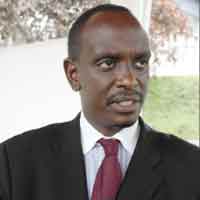The United Nations Security Council has unanimously passed a resolution demanding immediate unconditional disarmament, demobilization and repatriation of all Rwandan militia groups operating


The United Nations Security Council has unanimously passed a resolution demanding immediate unconditional disarmament, demobilization and repatriation of all Rwandan militia groups operating in the neighbouring Democratic Republic of Congo (DRC).
"The Security Council demands that all members of the FDLR, ex-FAR/Interahamwe, and other Rwandan armed groups operating in the eastern Democratic Republic of the Congo immediately lay down their arms and present themselves without any further delay or preconditions to Congolese authorities and MONUC (UN Mission in Congo) for their disarmament, demobilization, repatriation, resettlement and reintegration," the 15-member Council said in resolution 1804 passed on March 13, 2008.
The resolution posted on the UN website also demands that the Rwandan armed groups "immediately stop recruiting and using children, release all children associated with them, and put an end to gender-based violence, particularly rape and other forms of sexual abuse, and all other forms of violence," adding that those responsible must be brought to justice.
It also calls for more cooperation between Rwanda and DRC to ensure the implementation of the November 9, 2007 Nairobi Communiqué between both countries. In the communiqué, Kinshasa committed itself to forcibly disarm Rwandan militias holed up in its territory and the operations were set to begin sometime this month.
The Security Council also announced it was considering expanding a travel ban and an asset freeze it had put on three FDLR rebel leaders to other Rwandan militants and "persons providing other forms of assistance to them."
Sanctions
The UN Security Council further called upon "member states to consider taking the measures necessary to prevent the provision by their nationals or from their territories of any financial, technical or other forms of support to or for the benefit of the FDLR, ex-FAR/Interahamwe or other Rwandan armed groups operating in the territory of the Democratic Republic of the Congo."
Among the rebel leaders already subject to a 2005 UN financial and travel bans include FDLR leader, Ignace Murwanashyaka, who despite the ban, travelled from the DRC to Germany, his current residence, in April 2006.
The Council also re-stated Monuc’s mandate as "to facilitate the voluntary demobilization and repatriation of disarmed foreign combatants and their dependants, and to use all necessary means, within the limits of its capacity and in the areas where its units are deployed, to support operations led by the integrated brigades of the Armed Forces of the Democratic Republic of the Congo (FARDC) with a view to disarming the recalcitrant armed groups in order to ensure their participation in the disarmament, demobilization, repatriation, resettlement and reintegration process."
Under the Nairobi Communiqué, Monuc – previously accused by Kigali of not doing enough to help disarm and repatriate the Rwandan armed groups – committed itself to support the Congolese army in fulfilling its pledges in the accord.
The Council’s promise that it would expand financial and travel sanctions to include other militia leaders follows frequent calls by regional nations, especially through a US-backed diplomatic platform known as the Tripartite Plus Joint Commission (TPJC), which groups together Rwanda, DRC, Burundi and Uganda.
Under the same diplomatic framework, ex-FAR/Interahamwe and other armed groups in the region were blacklisted as "terrorist groups." Washington D.C also maintains FDLR on a list of terrorist organizations.
Rwanda reacts
Rwanda has welcomed the latest Security Council’s resolution on the militants.
President Paul Kagame’s Special Envoy to the Great Lakes Region, Amb. Richard Sezibera, said yesterday that the resolution was commendable. He urged UN member states to observe the Council’s call for the respect of the sanctions against FDLR rebel leaders.
"We welcome the resolution– especially when it is from the Security Council– on the unconditional disarmament and repatriation of FDLR rebels. But we regret the fact that it has taken 14 years for the Security Council to do it," he said.
"We call on FDLR to return home and we guarantee them that they will be received with security and safety. They will be reintegrated into the Rwandan society with the dignity deserving of Rwandans," Dr Sezibera said.
He appealed to Germany, France, US and other countries where individuals with links to FDLR stay to act in accordance with the Security Council’s resolution.
The UN appeal is the latest in a series of high-level international efforts pushing for voluntary disarmament of the militias largely responsible for the death of at least one million people in the 1994 Genocide in Rwanda.
The rebels, estimated to be around 10,000, are also accused of committing despicable atrocities in eastern DRC, Burundi and Uganda.
In December, the Government of DRC shared a comprehensive action plan to disarm the militants with Kigali, as stipulated in the Nairobi Communiqué which was signed by the former Rwandan Foreign Affairs Minister, Dr Charles Murigande (now Minister for Cabinet Affairs) and Congolese Foreign Affairs Minister, Mbusa Nyamwisi.
The agreement was brokered by the UN and witnessed by the African Union, US and the European Union.
DR Congo has lately been involved in a sensitization campaign urging the FDLR to voluntary disarm.
Sezibera said of the campaign: "We understand it has been going on but we haven’t yet evaluated it to know how much it has achieved."
In its resolution, the Security Council also "welcomed the DRC’s decision to hold a meeting in Kisangani to address the issue of the presence of Rwandan armed groups in the country", and voiced "grave concerns" at the presence of other militias in eastern DRC, which perpetuates a "climate of insecurity in the whole region."
The Council also acknowledged a January 23 agreement between Kinshasa and Congolese armed groups describing it as "a major step towards the restoration of lasting peace and stability in the Great Lakes region." It urged its signatories to implement its provisions immediately.
Ends


